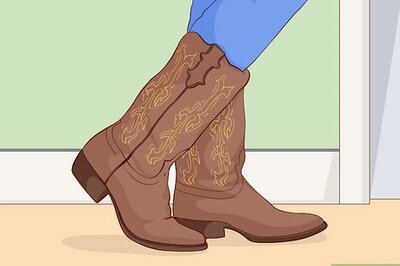
views
The Meaning of Shabbat Shalom
“Shabbat shalom” is a greeting for the weekly Sabbath. “Shabbat shalom” is a Hebrew phrase that literally translates to “Peaceful Sabbath.” Jewish people say the phrase to wish others well during Shabbat (also called the Sabbath), which is the weekly day of rest. “Shabbat shalom” can be said as a greeting or a farewell. It essentially means, “I hope you have a good Sabbath.” In Hebrew, “Shabbat shalom” is written as שַׁבַּת שָׁלוֹם. “Shalom” is a general greeting in Hebrew. While it literally translates to “Peace,” people use it to say “Hello” as well as “Goodbye.”
When and How to Use Shabbat Shalom
Greet people with “Shabbat shalom” during the Sabbath. Saying “Shabbat shalom” is the perfect way to say hello or goodbye to other people observing the Sabbath. It is a friendly and appropriate greeting to wish family, friends, members of your synagogue, rabbis, and other religious leaders well. “Shabbat shalom! It’s good to see you.” “Shabbat shalom! I hope you have a relaxing evening!”
Say “Shabbat shalom” if you won’t see someone on the Sabbath. It’s also appropriate to say “Shabbat shalom” as a goodbye in the days leading up to the Sabbath. This is a warm and friendly way to tell family, friends, and acquaintances that you hope their day of rest is enjoyable if you don’t plan on seeing them until the Sabbath is over. “Shabbat shalom! Have a great rest of your week!” “If I don’t see you before Saturday, Shabbat shalom!”
How to Respond to Shabbat Shalom
Say “Shabbat shalom” back, or use another Sabbath greeting. When someone greets you with “Shabbat shalom” or says it as a goodbye, simply reply with it back to wish them a good day of rest, too. Or, say “Good Shabbos” or “Gut Shabbos,” which means “Good Sabbath” in Yiddish. “Shabbat shalom to you, too!” “Thank you! Good Shabbos!”
Wish someone “Shavua tov” when Shabbat is over. “Shavua tov” is another Hebrew phrase that translates to “Good week.” When the Sabbath officially ends on Saturday evening, use this phrase to say you hope your family and friends have a good week ahead. “Shavua tov! Let’s make this week a good one!” “I’m glad we got to catch up. Shavua tov!” Feel free to say this phrase during the first few days of the new week, too. Alternatively, say the Yiddish phrase “Gut voch,” which also means “Good week.”
What is Shabbat?
Shabbat is the weekly day of rest from Friday to Saturday night. In Judaism, God created heaven and earth in 6 days and rested on the seventh day (Saturday), declaring it a holy day of rest. Jewish people observe the Sabbath every week starting at sundown on Friday evening until 3 stars appear in the sky on Saturday night. The Sabbath begins on Friday evening after you light 2 candles and say a prayer. Then, you bless wine and challah and share a meal with your family. On Saturday evening, you perform havdalah to end the Sabbath and enter the new week. During the ceremony, you bless wine, smell spices, light a candle, and recite blessings.
During Shabbat, you connect with yourself, your family, and God. The Sabbath is truly a time for rest and contemplation. You are commanded to slow down, refrain from work, and recharge from the busy week. For instance, you might attend synagogue, pray, hang out with friends, catch up with your family, or pursue your hobbies, like reading, crafting, or playing an instrument. Many Jews take time on the Sabbath to celebrate God’s creation and reflect on their spirituality. Note: People interpret and observe the Sabbath differently. For instance, casual practitioners might focus more on relaxation and family bonding. More orthodox Jews might refrain from all kinds of work, including using electricity, driving, and cooking.




















Comments
0 comment